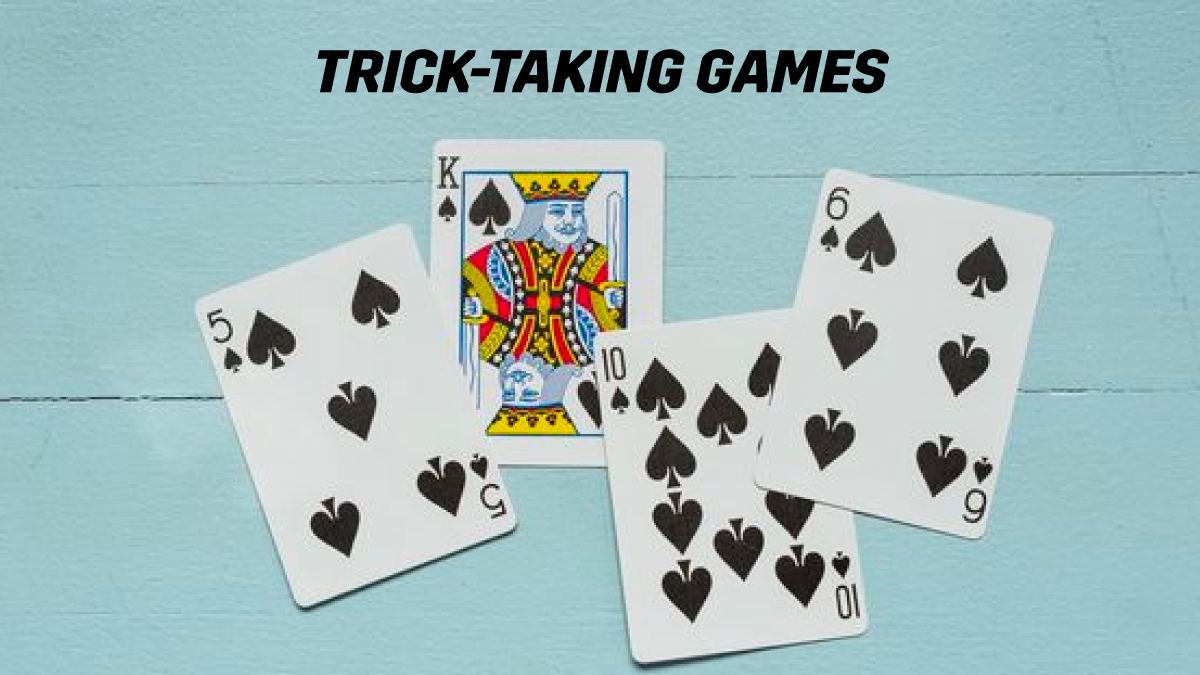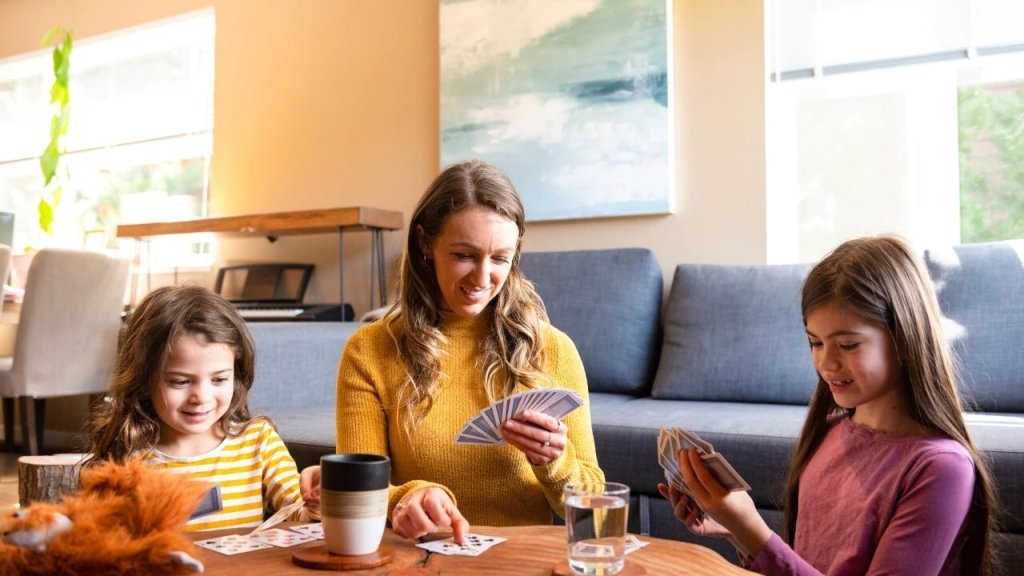Card games have long been immensely popular.
From the soldiers in the First World War and the Great Depression in the 1930s, card games have withstood the test of time.
Card games are here to stay and will stay put for a long time, even with the advent of technology and the Internet.
If anything, these things have helped spike up the popularity of card games in the younger demographic.
But, like any other game, card games are not created equal; some are situationally better than others.
For gamblers, Poker, Blackjack, and Baccarat are possible games of choice.
However, trick-taking card games are the best for families looking to have some wholesome fun.
What Is a Trick-Taking Card Game?

A trick-taking card game is where players rotate in playing their cards, and the highest card in each round wins.
The “trick” here is the one play of cards by each person involved in the game.
The pile of cards is won by the person who has the “best” or “highest” card, although “best” is probably the better description since cards of the highest suit do not always win.
This type of game has always been popular in any age demographic because it can accommodate several players.
This trick-taking card game, like Spades, is a go-to for families and groups of friends worldwide. While some rules sound complicated, they are very easy to learn.
All you need is to play a few hands, and you’ll eventually catch on. This card game is your cup of tea if you like a little friendly competition.
3 Trick-Taking Card Games Other Than Spades
The whole trick-taking card game universe does not revolve around Spades alone.
Every once in a while, you can spice up the competition a little by playing any of these 5 alternatives:
1. Hearts

Hearts is older than Spades by several decades, but a game called Reverse was its predecessor several centuries back.
Hearts can be played anywhere between three to seven, although four players are ideal. Unlike Spades, this is not a partnership game, so individuals look out only for themselves.
The goal of Hearts is to lose certain tricks rather than win them. The tricks you want to lose involve the Hearts (hence the name) and the dreaded Queen of Spades (the Black Maria).
Scoring in Hearts is also reversed since the lowest score will be declared the winner.
How to Play Hearts
- Start with a standard deck of 52 cards. Suppose the number of players is four. The deck can be dealt equally, with 13 cards to each player sitting around the dining table in the dining room.
- Remember that the goal is to have the lowest score and avoid the Hearts and Black Maria. Each Heart you get is scored 1 point, and the Queen of Spades is a whopping 13!
- Because Hearts is a trick-taking card game, the goal of having the least number of points can be tricky, no pun intended. The one with the highest card in each round wins the “trick.”
- You can pass three cards to fellow players in the first three hands. On the first hand, you pass the cards to the player on your left, the second hand to your right, and the third hand across. If you have the Black Maria, you can pass it to a fellow player and now be on the lookout for it.
- The player who has the Two of Clubs starts the game. Play continues clockwise, and each player should follow the lead suit whenever possible. The player that takes the trick can play whatever suit he likes except Hearts. Hearts may only be broken if the player does not have a card with the leading suit or he has no other cards to lead but a Heart. The play continues until all the cards run out.
- An exception to the scoring rule is when a player collects all of the Hearts and the Queen of Spades. This is called “Shooting the Moon.” The player collects ZERO points; the other three are automatically given 26.
- When a player reaches 99 points, the game stops, and the player with the lowest points is declared the winner.
2. Euchre

Euchre is similar to Spades because it’s a partnership game.
However, the gameplay is easier and is played in variations of a 24 or 32-deck card (25 in British Euchre).
Like Spades, Euchre is very popular and has many dedicated fans.
It can be played ideally with four people, but a variation also exists for three people. The goal is to win tricks and reach the predetermined number of points.
How to Play Euchre
- For the 24-card Euchre, only Aces, Kings, Queens, Jacks, 10s, and Nines of each suit. Deal the cards so each of the four players has five cards each, and the remaining four will be on a separate deck. The last card of the remaining deck will be revealed for everyone to see.
- The goal of the game is to win as many tricks as possible. The winner of the trick is the player who has the highest-ranking card.
- Euchre is unique because it established a “trump” card that affects the rankings of the card. To establish the trump, the card on the remaining deck facing up is the first possible trump card.
- Starting with the player on the dealer’s left, each player can accept this suit as the trump. If the player passes, the next player to the left will decide. If he agrees, that suit becomes the trump. The dealer picks up the trump and replaces it with another card in his deck. He puts that card in the remaining deck face down. If all four players pass, the player on the dealer’s left will ultimately decide the trump suit.
- When the trump suit is established, the Jack of that suit automatically becomes the highest-ranking card. The Jack of the same color becomes a “trump” card; that is, it becomes the second-highest card behind the Jack of the trump suit. For example, if the trump suit is a spade, the Jack of Spades’ becomes the highest-ranking card. The next in rank would be a Jack of clubs.
- The player on the dealer’s left will begin the game. He can lead off with any card in his hand. The next player should play a card of the same suit. If he doesn’t have one, he can play any suit card. The player with the highest card of the leadoff suit wins the trick. However, if trump cards are played, the highest-ranking card always wins.
- Once everyone is out of cards, the teams now calculate the scores. The team that chose the trump suit wins 1 point for every trick if they win 3-4. No more than that, and each trick is worth 2 points. The other team wins 2 points for every trick if they win 3-4 tricks, and 4 points each if they win more.
3. Oh Hell
:max_bytes(150000):strip_icc()/high-angle-view-of-cards-on-table-546838887-5ac2c7a8303713003721329b.jpg)
Oh Hell is called by at least a dozen other names, such as Blackout, Up and Down the River, and Oh Pshaw.
Whatever you call this game, it’s always an exciting one! It involves individual strategizing and is ideal for three to seven players.
The object of the game is to earn points by taking the exact number of tricks you guessed you would.
For example, if Player A guessed he would win three tricks before the round and won exactly three, he scores an additional 10 points.
How to Play Oh Hell
- Deal out an equal number of cards to each player. However, don’t deal with all the cards. There should be a few remaining cards to start the game.
- The top card from the remaining deck is flipped over. Whatever card that is, its suit will become the trump suit. At this point, each player will guess how many tricks they win.
- The person to the left of the dealer leads off a card. The other players should play the card of the same suit, and the winner that plays the highest-ranking card wins the trick.
- A player can play any other suit if he doesn’t have the lead-off suit. If he plays a card of the trump suit in this situation, it automatically beats all the other suits, even if it’s an Ace.
- The player that wins the trick leads off another round. The round ends when all players no longer have any cards in their hands.
- Each trick won scores 1 point. But as previously mentioned, the player that correctly guesses won tricks has an additional 10 points.
Final Thoughts
Trick-taking card games have existed for a long time, and it’s easy to see why.
They are fun, competitive, and modifiable, providing wholesome fun for friends and family.
Moreover, you don’t have to worry about the environmental impact on your small palm trees while playing cards.
Most playing cards are recyclable, so if you’re done with them, you can recycle them yourself or have them processed by a recycling station.
They can be turned into other useful products like toilet paper, table napkins, and new playing cards.

